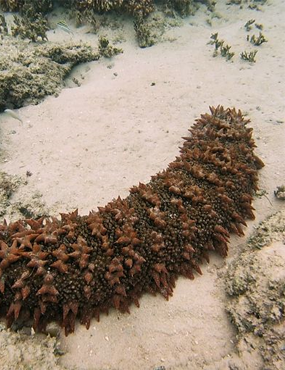Macquarie researchers are set to lead a first-of-its-kind sea cucumber monitoring project across the Great Barrier Reef, utilising remote-sensing such as underwater and aerial drones, and machine learning techniques to understand more about the short-term and long-term sustainability of commercial fisheries on these sea cucumbers, including protected and threatened species.
14 September 2022
Led by Macquarie University researchers, a new, innovation-driven program has been launched to keep close tabs on the health and sustainability of sea cucumber species within the Great Barrier Reef.

Lead research, Associate Professor Jane Williamson from the School of Natural Sciences says the research team will aim to better understand the short and long-term sustainability of sea cucumbers on the Great Barrier Reef, including impacts of commercial fishing and potentially climate on the species.
“Populations of sea cucumbers are declining globally, largely due to harvesting. Sea cucumbers on the Great Barrier Reef have been harvested through a commercial fishery for
Decades. While our fisheries use best practice, we really need a fishery-independent assessment of the species to understand their sustainability and to guide the fisheries” says Associate Professor Williamson.
The project will see a team of researchers from Macquarie University, James Cook University and the University of Newcastle work together alongside commercial fishers, traditional owners, and other stakeholders to assess the population and demography of sea cucumbers on the Great Barrier Reef through new technologies like aerial and underwater drones, remoting-sensing techniques, and machine learning. This will be the largest survey of its kind globally for sea cucumbers.
“Our researchers are harnessing new data captured in the field, including footage by drones as well as remotely operated vehicles and compare these results with more traditional methods like in-situ counting of individual sea cucumbers via divers to get a more accurate and broader understanding of sea cucumber populations,” says Associate Professor Williamson.
“We will also have access to and will utilise data collected over years by commercial fisheries to bolster our understanding of the species abundance of sea cucumbers in the Great Barrier Reef.”
The researchers hope the project will reveal the impacts of sea cucumber harvesting and will inform new initiatives around the real-world management of sea cucumber populations by fisheries, traditional owners and Government.
Image credit: K. McSpadden